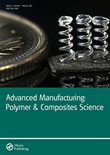
Advanced Manufacturing-Polymer & Composites Science
Scope & Guideline
Fostering Collaboration in Cutting-Edge Research
Introduction
Aims and Scopes
- Advanced Manufacturing Techniques:
Focuses on the development and optimization of novel manufacturing processes such as additive manufacturing, resin transfer molding, and vacuum infusion, specifically for polymer and composite materials. - Material Performance and Properties:
Investigates the mechanical, thermal, and chemical properties of various polymer composites, including bio-based and recycled materials, emphasizing their applications in industries like aerospace, automotive, and biomedical. - Process Optimization and Modeling:
Utilizes advanced optimization techniques, including Bayesian optimization and Taguchi methods, to enhance manufacturing processes and predict outcomes, ensuring improved efficiency and product quality. - Sustainability and Waste Management:
Explores methods for recycling and reusing composite materials, focusing on environmental impact and the development of bio-based composite solutions. - Innovative Testing and Characterization Methods:
Develops new experimental and numerical techniques for evaluating the performance of composite materials, including fatigue testing and in-situ monitoring of curing processes.
Trending and Emerging
- Additive Manufacturing Innovations:
A surge in research on additive manufacturing techniques, particularly for creating complex geometries in biomedical and aerospace applications, signifies a growing interest in this area. - Bio-based and Sustainable Materials:
An increasing number of studies focus on bio-based composites and sustainable manufacturing practices, highlighting a trend towards environmentally friendly materials and processes. - Advanced Process Simulation and Optimization:
The use of sophisticated modeling and simulation techniques to predict and optimize manufacturing outcomes has gained prominence, demonstrating a shift toward data-driven manufacturing approaches. - Recycling and Waste Valorization:
Research on the recycling of composite materials and the valorization of waste materials reflects a growing concern for sustainability and resource efficiency in the manufacturing sector. - Multi-objective Optimization Techniques:
There is a notable trend towards employing multi-objective optimization methods to balance competing manufacturing goals, such as cost, performance, and environmental impact, showcasing a sophisticated approach to process design.
Declining or Waning
- Traditional Composite Manufacturing Processes:
There has been a noticeable reduction in papers focusing on conventional composite manufacturing techniques, such as autoclave molding, as more emphasis is placed on advanced and automated methods. - Basic Material Characterization:
Research centered on fundamental material characterization without the application of advanced techniques or innovative methodologies is less prevalent, indicating a shift towards more applied and practical studies. - Homogeneous Material Systems:
The exploration of homogeneous polymer systems is declining in favor of more complex hybrid and composite materials, reflecting the industry's move towards multifunctional materials.
Similar Journals
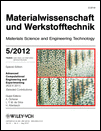
MATERIALWISSENSCHAFT UND WERKSTOFFTECHNIK
Innovating Tomorrow's Materials Today.MATERIALWISSENSCHAFT UND WERKSTOFFTECHNIK, published by WILEY-V C H VERLAG GMBH, is a prominent journal dedicated to the field of materials science and engineering. With its ISSN 0933-5137 and E-ISSN 1521-4052, this journal serves as a vital resource for researchers and professionals engaged in exploring the intricate relationships between the properties of materials and their applications. Established in 1970 and continuing through 2024, the journal has been consistently recognized in various categories, achieving a Q3 ranking in 2023 across Condensed Matter Physics, Materials Science (miscellaneous), Mechanical Engineering, and Mechanics of Materials. Although it does not offer open access, its high-quality peer-reviewed content is fundamental to the advancement of knowledge within its three key areas: novel material development, material characterization, and application of materials in engineering contexts. As a driving force in the scientific community, MATERIALWISSENSCHAFT UND WERKSTOFFTECHNIK continues to cater to the curiosity of aspiring students, seasoned professionals, and researchers alike, facilitating a deeper understanding of the complexities of material technology.

Advanced Industrial and Engineering Polymer Research
Pioneering Innovations in Polymer ScienceAdvanced Industrial and Engineering Polymer Research (ISSN: 2542-5048), published by KEAI PUBLISHING LTD, stands as a pivotal Open Access journal dedicated to the cutting-edge advancements within the fields of materials science and polymer engineering. Established in 2018, this journal aims to foster innovation and disseminate high-quality research that spans the realms of chemical engineering, industrial and manufacturing processes, and polymer applications. With impressive category quartile rankings in Q1 across various disciplines—including Chemical Engineering, Industrial and Manufacturing Engineering, and Materials Science—this journal represents a significant resource for researchers, industry professionals, and students alike. Offering access from its headquarters in Beijing, China, and embracing a commitment to open access since its inception, Advanced Industrial and Engineering Polymer Research ensures that groundbreaking findings are readily available, facilitating collaboration and enhancing knowledge in the global scientific community.

INTERNATIONAL POLYMER PROCESSING
Exploring Innovations in Polymer Processing TechnologiesINTERNATIONAL POLYMER PROCESSING, published by WALTER DE GRUYTER GMBH, serves as a crucial platform for professionals and researchers in the fields of Chemical Engineering, Industrial and Manufacturing Engineering, and Materials Science, particularly focusing on polymers and plastics. With its ISSN 0930-777X and E-ISSN 2195-8602, this journal has been in circulation since 1988 and continues to expand its contributions to contemporary research trends through to 2024. Ranking in the third quartile across multiple categories, including Chemical Engineering (miscellaneous) and Materials Chemistry, it offers insightful and rigorous peer-reviewed articles that enhance the understanding of polymer processing technologies and innovations. This journal is vital for anyone engaged in polymer science and engineering, providing both theoretical and practical perspectives that advance the field. Although it does not provide open access, the journal's content is indispensable for academia and industry professionals looking to stay at the forefront of polymer research.
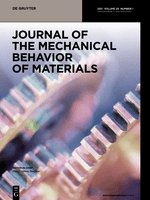
JOURNAL OF THE MECHANICAL BEHAVIOR OF MATERIALS
Advancing Knowledge in Material BehaviorJOURNAL OF THE MECHANICAL BEHAVIOR OF MATERIALS, published by DE GRUYTER POLAND SP Z O O, is a prominent open-access journal in the field of materials science and mechanics, dedicated to facilitating the dissemination of high-quality research findings since 2019. With an ISSN of 0334-8938 and an E-ISSN of 2191-0243, this journal provides a platform for researchers, professionals, and students to explore the mechanical behaviors of various materials, crucial for advancing engineering and scientific applications. The journal's impact is evidenced by its impressive rankings, including Q2 status in both Materials Science (miscellaneous) and Mechanics of Materials as of 2023. With a Scopus rank placing it in the top-half of indexed journals, the JOURNAL OF THE MECHANICAL BEHAVIOR OF MATERIALS is a vital resource for anyone looking to stay at the forefront of material behavior research. Based in Germany, it serves the global academic community while catering to the evolving needs of industry practitioners through its comprehensive open-access model.

Functional Composites and Structures
Exploring the Synergy of Composites and Structures.Functional Composites and Structures is a prestigious academic journal published by IOP Publishing Ltd, dedicated to advancing the field of materials science with a focus on innovative composite materials and their structural applications. Established in 2019 and running through 2024, this journal uniquely bridges several disciplines, consistently ranking in the Q2 quartile across key categories including Ceramics and Composites, Electronic, Optical and Magnetic Materials, and Mechanics of Materials. With a commendable Scopus rank that places it within the top tiers of its field, the journal is instrumental for researchers, engineers, and scholars seeking to explore the latest developments in material properties, functionality, and applications. Although access options are not specified, the open-access nature of the journal promotes wider dissemination and engagement with cutting-edge research. As the demand for smarter, more efficient materials continues to grow, Functional Composites and Structures serves as a vital resource for fostering collaboration and driving innovation in material sciences.
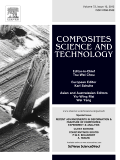
COMPOSITES SCIENCE AND TECHNOLOGY
Unlocking Potential through Cutting-Edge Composite TechnologiesComposites Science and Technology, a premier journal published by Elsevier Sci Ltd, serves as a vital resource in the fields of composite materials and engineering. With an impressive 2023 impact factor reflecting its influential contributions, this journal has established itself within the top tier of academic publishing, flaunting a Q1 ranking in both the Ceramics and Composites and Engineering (Miscellaneous) categories. Covering a diverse range of topics from the development of novel composite materials to their practical applications across various industries, it is recognized for its rigorous peer-review process and high-quality research outputs. As reflected in its Scopus rankings, Composites Science and Technology places in the 97th percentile among general engineering journals and the 94th percentile amongst ceramics and composites science literature. Researchers and professionals alike benefit from its comprehensive access to cutting-edge discoveries and advancements, making it an indispensable tool for driving innovation within this dynamic field.
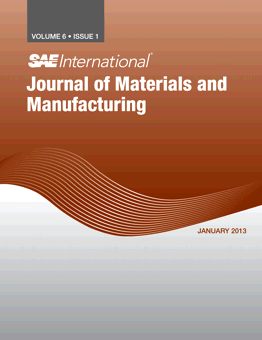
SAE International Journal of Materials and Manufacturing
Empowering Research for a Sustainable Manufacturing FutureSAE International Journal of Materials and Manufacturing, published by SAE International, is a leading peer-reviewed journal that focuses on the advancements and research in the fields of materials science and manufacturing engineering. With ISSN 1946-3979 and E-ISSN 1946-3987, this journal is an essential resource for researchers, professionals, and students who are keen on exploring innovative materials and modern manufacturing techniques. Although the journal currently does not offer open access options, its rigorous selection process ensures the publication of high-quality papers that contribute significantly to the knowledge base in the industry. Recognized within the third and fourth quartiles across various engineering categories, including Industrial and Manufacturing Engineering and Mechanical Engineering, the journal provides an impactful platform for disseminating groundbreaking research. With a converged history since 2002 and a comprehensive approach to critical topics in mechanics of materials, it empowers the academic community with vital insights, trends, and methodologies that propel the future of manufacturing excellence.
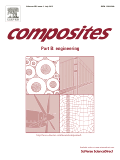
COMPOSITES PART B-ENGINEERING
Elevating Knowledge in Mechanical Engineering and CompositesCOMPOSITES PART B-ENGINEERING, published by Elsevier Science Ltd, stands at the forefront of research in the fields of engineering and materials science, specifically targeting the domains of composites, ceramics, and mechanical engineering. With an impressive impact factor and categorized in the prestigious Q1 quartiles across multiple categories including Industrial and Manufacturing Engineering and Mechanics of Materials, this journal fosters innovative research that significantly contributes to the advancement of composite materials and their applications. The journal has been diligently publishing high-quality peer-reviewed articles since its inception in 1996, and it continues to attract top-tier contributors and researchers who are dedicated to exploring emergent technologies and methodologies. Researchers, professionals, and students will find valuable insights and an extensive pool of resources in this essential journal, available through Open Access options that enhance its visibility and reach, allowing the dissemination of crucial knowledge to the global scientific community.

Elastomers and Composites
Elevating Knowledge in Material Properties and ApplicationsElastomers and Composites is a leading academic journal dedicated to the advancement of knowledge in the fields of polymer science and materials engineering, specifically focusing on elastomers and composite materials. Published by RUBBER SOC KOREA, this journal serves as a vital platform for researchers and professionals to disseminate innovative research findings and insights in material properties, applications, and synthesis techniques. Although it currently does not offer open access, the journal provides rigorous peer-reviewed content that enhances the global dialogue on elastomeric materials and their composites, reflecting its commitment to high-quality scholarship. With a strong emphasis on practical relevance and theoretical advancements, Elastomers and Composites aspires to reshape industry practices and academic thought, making it an invaluable resource for students, researchers, and practitioners alike. Positioned strategically within its field, this journal fosters collaboration and dialogue among scientific communities, all while supporting the growth of cutting-edge research programs worldwide.

Journal of Polymer & Composites
Exploring the Future of Polymer Chemistry and Engineering.Journal of Polymer & Composites, with ISSN 2321-8525 and E-ISSN 2321-2810, is an esteemed academic journal published by STM JOURNALS, dedicated to the advancement of knowledge in the rapidly evolving fields of polymer science and composite materials. The journal serves as a pivotal platform for researchers and professionals, offering cutting-edge research articles, reviews, and case studies that explore innovative developments and applications in polymer chemistry, material science, and engineering. Although currently lacking an impact factor citation, the journal aims to foster dialogue among academia and industry partners, addressing the latest trends and breakthroughs that drive the field forward. With a commitment to scholarly excellence, the Journal of Polymer & Composites is positioned as an essential resource for enhancing the understanding of polymer composites and their multifaceted applications. Notably, STM JOURNALS' reputation for quality publications underscores the journal’s importance in facilitating impactful research and educational initiatives worldwide.